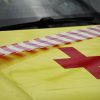Dominic Cummings’ plan to test millions of people a day for coronavirus led the government to spend over £800m on quick turnaround tests that were later found in a pilot to give the wrong results as much as 60% of the time, the Guardian can reveal.
Operation Moonshot, a mass testing scheme championed by the prime minister’s former chief adviser, prompted the government to buy huge numbers of so-called lateral flow tests from a company owned by a little-known US private equity house.
What are the pros and cons of mass Covid testing in England?
Read more
Innova Medical Group is now believed to be the largest single recipient of payments from UK government contracts during the pandemic. More than 380m Innova tests have been bought so far by the UK government, but now a fierce debate is raging among scientists about how they should be used.
While Moonshot has fallen well short of its target of testing 10 million people a day by early 2021, the Innova tests were used to mass-test the city of Liverpool and are now being offered to NHS staff, visitors to care homes, teachers and students. The Department of Health has now secured authorisation for this sort of test to be used for self-testing at home.
The relatively poor performance of the 30-minute tests in real-world settings where people swab themselves, compared with lab conditions, is dividing opinion over the wisdom of the government’s investment.
Ministers and some leading scientists take the pragmatic view that the tests pick up people with Covid who do not realise they have it and so save lives. But critics say people who get a false negative result inevitably assume they are free of the virus, interpreting it as a green light to go to work or visit someone who is frail – with potentially disastrous consequences.
Innova secured the contracts, worth a total of £829m, in the last four months of 2020. Based in California, the group is owned by the equity house Pasaca Capital, which was founded by Charles Huang, a Chinese businessman born in Wuhan who did a PhD at Strathclyde University.
Innova secured the exclusive global rights to lateral flow tests, or LFTs, made by a Chinese company called Biotime Biotechnology, in Xiamen city, Fujian province.
Daniel Elliott, Innova’s chief executive, told the Guardian that his company was dispatching about 4.5m tests a day to the UK before Christmas, and anticipated it would be scaling this up to 15m a day by the end of January.
“The way to put it, in terms of scale, is we ship a Boeing 777 cargo jet every single day to the UK,” he said.”
The evaluation
The UK government’s first contract with Innova was agreed on 17 September, before the evaluation of its tests had been completed. A government source said a clause in the contract permitted it to abandon the purchase if the tests failed their evaluation.
“There was huge worldwide demand, we had to buy before we knew they worked,” said Prof Tim Peto of Oxford University, chief investigator for lateral flow tests.
Peto was asked by Sir John Bell, fellow Oxford academic and overseer of LFTs for the government, to evaluate their performance with Public Health England at Porton Down.
The evaluation team found the accuracy of the Innova test was on average 79% when the test was given by lab scientists, 73% when given by health workers and 57.5% when people swabbed and tested themselves. Innova does not dispute this. “The delivery of appropriate training appears important to test performance,” the evaluators noted in their report.
Peto recalls the Oxford team being excited with the results from limited early trials as they came through in late October and still describes the tests as transformative. “They are gamechangers; they give you a free pass for 24 hours.”
They were equally exciting for a government desperate to avoid further lockdowns. “The Moonshot idea preceded LFT, then LFT was the knight in shining armour to save the day,” Peto said.
Over the summer, cities around the country with rising caseloads were encouraged to pilot the tests by a Cabinet Office Covid taskforce and the prime minister’s chief strategist, Sir Edward Lister.
“Ed and his team came to visit areas with high rates of Covid and kept mentioning LFTs and that the PM was very keen,” said a senior public health source, adding that many directors of public health remained unconvinced.
“When we raised questions, we were told … it was in Moonshot and was a proposal with endless amounts of money. The phrase they constantly used to us was ‘No regrets’.”
The source said they took that to mean Downing Street wanted to spend massively on the population-wide testing scheme and was not worried if the experiment failed. “We were told that Dominic Cummings’ phrase was ‘We want to get ahead of the science’,” he said.
The Guardian understands the Oxford team presented the results of their evaluation of Innova’s tests to Cummings in late October, with the health secretary, Matt Hancock, also present. The decision to roll the tests out in a large field pilot as soon as possible was pushed by Cummings a couple of weeks before he resigned.
Liverpool, where cases had skyrocketed, became the first city to pilot the LFTs for mass testing of people without symptoms. According to figures from the University of Liverpool, about 125,000 residents took lateral flow tests in the city between 6 November and 9 December. Of those, 897 people who did not know they had the virus tested positive and were stopped from spreading it further.
However the tests in the field missed 60% of infections in people who were self-swabbing. It should be easier to detect infections in people with high viral loads but they missed 30% of those.
Do you have information about this story? Email investigations@theguardian.com, or use Signal or WhatsApp to message (UK) +44 7584 640566 or (US) +1 646 886 8761.
Peto insists that the Liverpool trial was successful. “Sceptics in Liverpool became converts,” he said.
But many sceptics remain. Chief among them is Jon Deeks, a professor of biostatistics and head of the test evaluation research group at the University of Birmingham.
He argues that government claims about the reliability of the tests are based on studies using lab scientists and nurses that do not match real-world conditions. In the field, when tests are self-administered, the results are poorer, he says.
Deeks accuses the government of ignoring the potential harm of significant numbers of people getting false negative results. And he argues that the public has been misled by the government championing these rapid tests in its communications as a way of avoiding self-isolation after contact with a Covid case.
“These are red light tests, not green light tests,” he said. If you have a negative result, “you can’t use it to say ‘it’s OK for me to go to work or go to school’.”
All lateral flow tests miss some Covid infections and should not be used as any sort of “passport”, adds Deeks, who is a member of a working group on Covid tests at the Royal Statistical Society and is currently working on an authoritative review of them.
Meanwhile, a group of scientists led by Prof Iain Buchan from Liverpool University have strongly rejected the criticisms of Deeks and colleagues, saying the Innova tests are effective, accurate and a key tool against Covid.
A spokesperson for Innova said it was not for the companies who produce and supply LFTs to get involved in the academic debate or to comment on how the government or its scientific advisers are promoting them.
Behind the Innova deal
While the debate over Innova tests has raged, less attention has been given to how the relatively obscure firm secured such a lucrative deal with the UK government, beating more established giants in the industry.
Innova’s agent in the UK is Kim Thonger, a former shoe retailer. He was running a small company called Disruptive Nanotechnology, based in Northamptonshire, whose 2019 accounts showed just £85 in the bank when he got the job. Operating as Tried&Tested, he and his partner Charles Palmer have been given distribution rights to the Innova tests for the UK and the European Union.
Thonger helped Innova negotiate the UK government bureaucracy.
“He worked tirelessly, frankly,” Elliott said of Thonger. “I can remember when we were inputting all of these things into the database that the UK government had – there were quite a bit of technical questions.”
They submitted the forms on the DHSC online portal in the first week of August. Then the calls began with the team from NHS test and trace responsible for innovation and supplies. “There was a lot of discussion of course about the technology, but it also came down to our ability to supply,” said Elliott. “Nobody else was anywhere near our production capacity.”
That included the giant companies Abbott and Roche, which both now have lateral flow tests validated by the World Health Organization (WHO) and contracts to fulfil all over the world, unlike Innova, which is still in the process of seeking validation from the United Nations health agency. Despite being based in California, Innova so far failed to convince the US government to buy its Chinese-made tests. The UK is understood to be its main customer.
Elliott said UK officials were “very surprised” by the quantities Innova could supply. “I think that was the ‘Aha!’ moment for them, because they were tasked with what felt like an impossible task. We had multiple calls within a 24-hour period. And they kept asking, can you really do this?”
DHSC said its evaluation of LFTs began on 15 August. Innova was “top of the pile”, Peto said.
Operation Moonshot ‘like building Channel tunnel without civil engineers’
Read more
On 9 September, a leak of confidential documents revealed the existence of Project Moonshot. “This is described by the prime minister as our only hope for avoiding a second national lockdown before a vaccine,” said a briefing paper to UK ministers. Launching Moonshot shortly afterwards, Boris Johnson described the plan as giving people the “freedom to mingle” and return to normal.
Within weeks, Innova had its first contract, for five shipments between September and early October, worth £103.6m. As that one ended, a second, much bigger contract was signed, for £496m. They did not go out to tender because of the “extreme urgency” and global demand, according the contract notice. On 18 December, a third UK contract was published with Innova, for £226m.
How the millions of LFTs acquired by the UK will now be used is perhaps the most critical question. The Medicines and Healthcare products Regulatory Authority (MHRA), which initially resisted authorising LFTs for self-testing, recently approved them for use by people at home.
However, an MHRA email seen by the Guardian suggests the regulator has not approved LFTs to “enable” people to dispense with the social distancing rules, mingle with friends or visit an elderly grandmother in a care home. The email states: “MHRA’s exceptional use authorisation only allows for the test to be used to “find” positive cases. MHRA have not approved the test for use in a ‘test to enable’ scenario.”
But there are instances in which negative results on Innova tests appear to have given people the false assurance that they did not carry disease.
One case relates to a hospital in the north of England where the Guardian was given details by a well-placed source of two healthcare workers who tested negative with Innova tests. They continued to work on a ward where patients had been free of the virus but then contracted it.
The owner of a Sussex nursing home believes that LFTs played a part in a Covid outbreak there. According to the owner of Pinewood nursing home, Lawrence Marsh, staff took the Innova tests and were negative before moving into the residential facility. But 36 hours later, four of them tested positive when the results of the PCR lab tests they had also taken came back. Fourteen of the 24 residents subsequently tested positive. Seven have died.
Innova’s spokesperson said it was unable to verify or comment on cases which were anecdotal or where neither it nor Tried&Tested had supplied the tests directly.
The Department of Health and Social Care said about one in three people with Covid have no symptoms and targeted asymptomatic testing “helps detect these cases and break the chains of transmission”.
The department added: “Lateral flow tests are effective at detecting infectious cases of coronavirus, are easy to use and give results in 30 minutes so those who test positive can isolate immediately. Hundreds of thousands of lateral flow tests are being carried out every day, with the majority taking place at dedicated tests sites for people without symptoms in a range of community settings.”























































Свежие комментарии